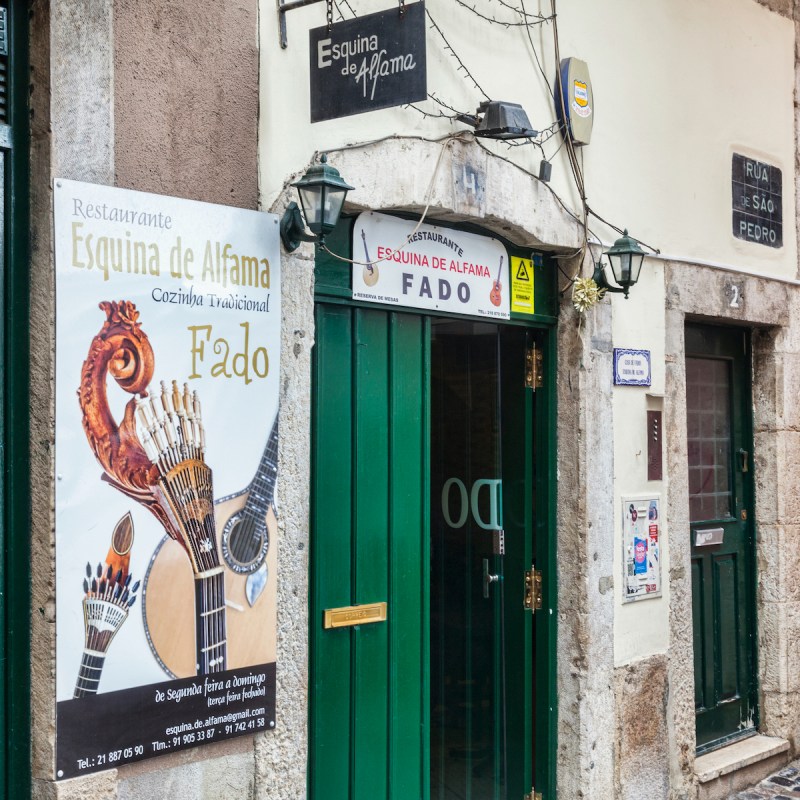
Portugal has a deep history and multifaceted culture. Some of its most endearing qualities come from its roots as a country full of explorers. These adventurers set off to discover the world and returned with stories, food, spices, and customs that eventually found their way into Portuguese life.
Videos by TravelAwaits
Portugal’s musical heritage came fully to life with a traditional music known as fado. This national art form has become strongly embedded in Portuguese culture and provides insight into the heart of the Portuguese people.
What Is Fado?
The direct English translation of fado is “fate,” which tells a little bit about the subject matter of this acoustic music. Full of lyrics with themes about loss, longing, sadness, and an inner aching, fado itself has a long history. Though it is unclear when exactly it began, it’s popularization can be traced back to the early 19th century in Lisbon, particularly the port districts of Alfama, Bairro Alto, and Mouraria. Fado tells stories about the hardships of life, remembrance of better times, and sweet sorrow set to moody and melancholy music. Sometimes it hints at the possibility of better things to come.
Originally, some fado performances included dancers as well as musicians and singers, similar to Spanish flamenco. But fado has evolved into more of a soulful music embodying saudade, the Portuguese expression of nostalgia and longing. In 2011, Portuguese fado was deemed a UNESCO Intangible Cultural Heritage.
Two Types Of Fado
While fado encompasses a recognizable style of music, very much the same way as classical or jazz, it too has some distinguishing characteristics within the genre. There are two distinct styles of fado: one belonging to the academic and educated higher classes and the other to the working class people of the city. Even though the ideas expressed are fairly consistent, fado’s tradition rests on the structure of the music rather than the lyrical content.

Coimbra Fado
The city of Coimbra is home to the University of Coimbra, the oldest university in Portugal and one of the oldest in Europe. This is where the academic style of Coimbra fado emerged. This style of fado is different for a few reasons. First, those playing it are always men and they often wear the black capes of academia associated with the university. The music also may be a little more upbeat with greater undertones of optimism and hope. Coimbra fado was often used by male students to serenade Coimbra ladies in hopes of sparking a romance.

Lisbon Fado
Lisbon fado originated more from the working classes and seafaring communities in the city. Although the origins of fado are murky, it is believed that sailors and workers told their stories of life’s challenges, loss, heartache, and remembrance in pubs, cafés, and restaurants in the port neighborhoods of Lisbon. But as Lisbon fado evolved, women singers came to the lead, reflecting the sadness and worry of those whose loved ones were lost at sea or faced danger, along with everyday troubles and trials. It is also possible to see fado outside of Lisbon, in places like Porto. These performances will typically be of the Lisbon fado type, which predominates today.
What A Fado Performance Is Like
Contrary to what might sound like a depressing evening, fado performances are often engaging, intimate, and memorable musical experiences. Fado singers are accompanied by any variety of acoustic guitars, violas, or sometimes a cello or bass. It is common for smaller venues to have one classical guitar and one 12-string Portuguese guitar, while larger venues or stage shows can have a fuller band.
Fado Venues
Fado performances can take place in different venues for unique experiences. A common approach to Lisbon fado is for a dinner show in a restaurant. Here, the audience enjoys a Portuguese meal followed by a fado performance. Another way to experience fado is at a small café or courtyard where drinks may be served but the music is the main attraction. In Coimbra, fado is performed at the cafés and chapels around the university, and at centers dedicated to fado education and performance.
Fado Singers
Fadistas, or fado singers, are both vocalists and storytellers. The first fadista to get national attention was Maria Severa, a prostitute from the Alfama district of Lisbon in the 1800s. She had a passionate love affair with a nobleman, which ended badly. She died at 26 but gave life to the haunting music filled with longing melancholy. In fact, fadistas often wear a black mourning shawl emulating what the songbird herself wore when singing of her broken heart.

In the 20th century, Amália Rodrigues picked up the mantle as the passionate lamenting voice that propelled her into fame. Amália became the icon of fado both nationally and internationally. She made recordings, movies, and appearances around the world. Her death in 1999 was followed by 3 days of mourning in Lisbon. Her remains were placed in the National Pantheon alongside royalty and important political and cultural figures.
Today, fado has been embraced by a new generation of fadistas who are both honoring its past and bringing it into the future. In particular, the young woman Mariza seems poised to become the next queen of fado. Born in Mozambique while it was still a Portuguese colony, she grew up in the Mouraria district of Lisbon, singing fado in her parents’ tavern since she was only 5 years old. Fado will keep its traditions and yet have new voices to bring it to life, much like Portugal itself.

Best Places To Experience Fado In Portugal
1. Casa De Amália Rodrigues Garden
Mouraria, Lisbon
The home of fado legend Amália Rodrigues offers intimate concerts in the secret garden outside the house. The house has been transformed into a museum where you can learn more about Amália’s impact around the world.
2. Povo
Cais De Sodré, Lisbon
Povo in Cais de Sodré is a great option to discover new fado singers developing their careers. The audiences are true fado lovers celebrating the music in a modern interpretation of the Portuguese tavern. Budding fadistas perform Tuesday through Sunday nights here.
3. Mesa De Frades
Alfama, Lisbon
Inside a former 18th-century chapel filled with azulejos tiles, Mesa de Frades offers an intimate setting with just a couple of rows of tables. The three-course, fixed menu followed by a candle-lit fado performance is more pricey, but unique and memorable. Be sure to book in advance.
4. A Baiuca
Alfama, Lisbon
To experience “fado vadio,” which is fado sung by amateurs rather than professionals, A Baicua is a fun spot. The family-run tasca is like a fado karaoke where locals, taxi drivers, and even the cooks and servers take a turn singing. It’s very small, so book in advance.
5. Sr. Vinho
Lapa, Lisbon
For an elegant fado experience, Sr. Vinho is a great treat. The owner is a famous fadista, Maria de Fe, who also performs regularly in the refined rustic restaurant. It features performances by some of the biggest names in fado along with an elevated menu of Portuguese cuisine.
6. ÀCapella
Coimbra
Offering a lovely terrace along with bar and tapas service, àCapella fado center is inside a 14th-century chapel-turned-synagogue in Coimbra’s Jewish quarter. True to the academic nature of Coimbra fado, the singer often provides an explanation of the music in English before the show, which is offered every night.
7. Fado Ao Centro
Coimbra
Located in the historical center of Coimbra is Fado ao Centro. This cultural association is dedicated to providing traditional Coimbra fado music with gifted musicians in live serenades and concert performances. There are also afternoon rehearsals where, if you happen to have your own musical instrument, you can join in. No food is served and the emphasis is on the music. Reservations are recommended.
8. Ideal Clube De Fado
Porto
Ideal Clube de Fado offers daily concerts from talented singers and musicians that provide improvisational and authentic performances. There is no food or drink served, so the music is the heart of the experience. Arrive 30 minutes before the performance and be treated to a chat with the musicians.
9. Taberna Real Do Fado
Porto
Located next to Porto’s famous Clérigos Tower, Taberna Real Do Fado offers delicious food, wine, and heartfelt fado performances. A cozy renovated space in the historic city center, Taberna mingles fado performances from both men and women between the courses of your meal. The Portuguese spirit, cuisine, and spellbinding music blend to make a perfect evening.

Pro Tip
To learn more about the story of fado and Portuguese music, we recommend a visit to the Fado Museum in Lisbon and the Museum of Portuguese Music in Monte Estoril. The Fado Museum offers great insight to the development of the fado tradition and the important stars of the genre. The Museum of Portuguese Music, located in a renovated historic home, boasts a large collection of musical instruments, compositions, documents, and artifacts illuminating various musical traditions of Portugal. Both museums offer programs, including seasonal concerts and presentations.

Experiencing fado helps understand the Portuguese people and an important part of their culture. While modern fadistas expand the music and bring it to new audiences, traditional fado is alive and well in a country that thrives on passionate expressions of the human condition. We recommend that visitors experience even a small taste of this delicious tradition that is just another reason we love Portugal.
